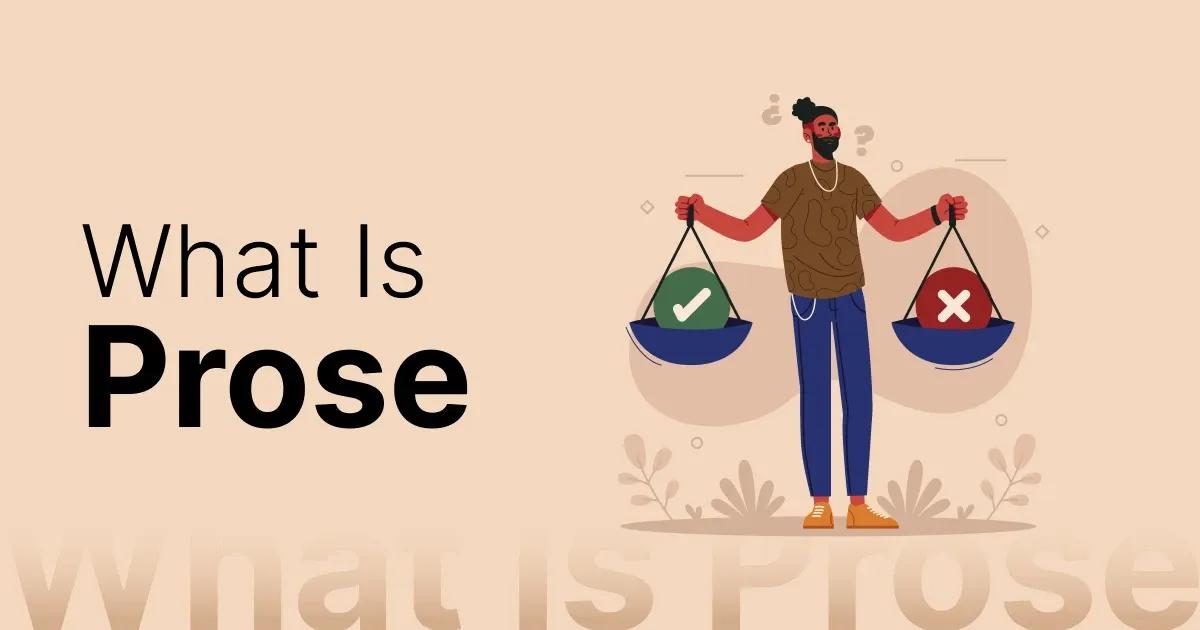In the vast sea of words, prose stands tall as a beacon of expression and understanding. It's the language we use every day, whether in telling stories, sharing ideas, or simply chatting with friends.
But what lies beneath the surface of this seemingly ordinary form of communication? In this comprehensive exploration, we embark on a journey to uncover the essence of prose, diving deep into its definition, meaning, and examples, all in language that's easy to grasp.
In this comprehensive guide, we'll delve into the depths of prose, uncovering its definition, exploring its essence, and unraveling its significance in both literature and everyday communication.
Understanding Prose: A Basic Definition
Let's start with the basics. Prose is the ordinary form of written or spoken language, without the rhythmic structure of poetry. It's the way we naturally communicate, using sentences and paragraphs to convey meaning.
Unlike poetry, which often employs meter, rhyme, and other stylistic devices, prose flows in a more straightforward manner, focusing on clarity and coherence.
The Essence of Prose: Meaning and Characteristics
At its core, prose is about conveying ideas and narratives in a clear and concise manner. It's the medium through which we express our thoughts, emotions, and experiences. Unlike poetry, which often aims to evoke imagery and emotion through its linguistic flourishes, prose prioritizes simplicity and directness. Its characteristics include:
-
Clarity: Prose aims to be easily understood by its readers, avoiding ambiguity and complexity.
-
Coherence: It presents ideas in a logical and organized manner, allowing readers to follow the flow of thought.
-
Narrative: Prose often tells stories or conveys information in a narrative form, engaging readers in a journey of exploration and discovery.
Differentiating Prose from Poetry and Drama
While prose, poetry, and drama all fall under the umbrella of literature, each has its own distinct characteristics and conventions. Poetry, for example, relies heavily on rhythm, meter, and sound patterns to create meaning and evoke emotion.
Drama, on the other hand, is characterized by its dialogue and stage directions, often intended for performance rather than solitary reading.
Elements of Prose Writing: Style, Structure, and Language
Prose writing encompasses a variety of elements that contribute to its effectiveness and impact. These include:
-
Style: The unique voice and tone of the author, which can vary from formal to informal, descriptive to analytical.
-
Structure: The organization of sentences, paragraphs, and chapters, which helps to guide readers through the text.
-
Language: The choice of words and phrases, including vocabulary, syntax, and figurative language, which shapes the overall tone and meaning of the prose.
Exploring the Role of Prose in Literature and Everyday Communication
Prose plays a central role in both literature and everyday communication. In literature, it serves as the primary medium for novels, short stories, essays, and other forms of fiction and non-fiction. It allows authors to explore complex themes, develop characters, and engage readers in rich and immersive worlds.
In everyday communication, prose is everywhere: in emails, text messages, social media posts, news articles, and more. It's how we share information, express our thoughts and opinions, and connect with others on a daily basis. Whether we're writing a report for work or composing a heartfelt letter to a loved one, prose is the vehicle through which we communicate our ideas and experiences.
Examples of Prose in Literature and Real-Life Situations
To better understand prose, let's take a look at some examples from both literature and real-life situations:
-
Literature: "To Kill a Mockingbird" by Harper Lee is a classic example of prose fiction, telling the story of a young girl growing up in the racially charged atmosphere of the American South. Lee's prose is simple yet evocative, capturing the voices and experiences of her characters with empathy and insight.
-
Real-Life Situations: A newspaper article reporting on a recent event, a personal essay reflecting on a memorable experience, or a business memo outlining a plan of action—all of these are examples of prose in real-life situations. Whether informing, persuading, or entertaining, prose serves as the foundation of effective communication in various contexts.
Crafting Effective Prose: Tips for Writers
For aspiring writers looking to hone their prose-writing skills, here are some tips to keep in mind:
-
Read Widely: Expose yourself to a diverse range of prose styles and genres to expand your vocabulary and develop your own voice.
-
Practice Regularly: Like any skill, writing prose improves with practice. Set aside time each day to write, experiment with different techniques, and refine your craft.
-
Edit Ruthlessly: Don't be afraid to revise and edit your prose until it shines. Cut unnecessary words, tighten sentences, and polish your writing until it conveys your message clearly and effectively.
Enhancing Prose with Grammar Checker Tools
In the quest for polished prose, grammar checker tools can be invaluable allies. These tools help writers identify and correct grammatical errors, punctuation mistakes, and stylistic inconsistencies that can detract from the clarity and coherence of their prose.
The Importance of Grammar Checking in Prose Writing
Effective prose is not just about conveying ideas—it's also about doing so with precision and accuracy. Grammar checking plays a crucial role in ensuring that your writing is free from errors and conforms to standard linguistic conventions.
Whether you're a seasoned professional or a novice writer, investing in a reliable grammar checker can help you elevate the quality of your prose and make a positive impression on your readers.
Introducing Copychecker: A Grammar Checker Tool for Prose
One such Grammar Checker tool is Copychecker, a user-friendly software designed to help writers improve the quality of their prose. With its intuitive interface and powerful features, Copychecker makes it easy to identify and correct grammar, spelling, and punctuation errors, as well as style and usage issues.
How Copychecker Improves Prose Writing: Features and Benefits
Copychecker offers a range of features and benefits to enhance your prose writing, including:
-
Grammar Checking: Detect and correct grammatical errors, such as subject-verb agreement, sentence fragments, and misplaced modifiers.
-
Spelling Correction: Identify and fix misspelled words, typos, and other spelling mistakes that can undermine the credibility of your writing.
-
Style Suggestions: Receive suggestions for improving the style and clarity of your prose, such as eliminating jargon, avoiding passive voice, and varying sentence structure.
Integrating Copychecker into Your Writing Process
Integrating Copychecker into your writing process is like having a helpful friend who points out mistakes and suggests improvements in your writing. Here's how you can make the most out of Copychecker:
-
Starting with a Clean Slate: Before you start writing, open Copychecker. This way, as you write, it can check your work instantly.
-
Writing Your First Draft: Don't worry about making mistakes in your first draft. Just let your ideas flow. Copychecker will be there to help you polish it later.
-
Running Copychecker After Writing: Once you've finished your draft, run Copychecker. It will scan your text and highlight any errors or areas for improvement.
-
Reviewing Copychecker Suggestions: Take your time to go through the suggestions Copychecker gives you. It might point out things like spelling mistakes, grammar errors, or ways to make your writing clearer.
-
Making Changes: Decide which suggestions you want to apply. Sometimes Copychecker might suggest changes that don't fit your style or what you're trying to say. That's okay! You're the boss of your writing. Only make changes that make sense to you.
-
Repeating as Needed: After making changes, you might want to run Copychecker again to make sure everything looks good. It's like giving your writing a final polish.
-
Learning from Copychecker: Pay attention to the mistakes Copychecker points out. Over time, you'll start to notice patterns in your writing that you can improve upon. Copychecker can help you become a better writer.
-
Customizing Settings (Optional): If you want, you can tweak Copychecker's settings to better suit your writing style. For example, you might want it to ignore certain words or types of errors. Play around with the settings until you find what works best for you.
By integrating Copychecker into your writing process, you can catch mistakes early, improve the clarity and quality of your writing, and become a more confident and effective writer. It's like having a writing coach by your side, cheering you on as you craft your prose
Addressing Common Prose Writing Mistakes with Copychecker
Some common prose writing mistakes that Copychecker can help you address include:
-
Run-on Sentences: Identify and break up long, unwieldy sentences to improve readability and clarity.
-
Dangling Modifiers: Correct misplaced modifiers that can lead to confusion or ambiguity in your prose.
-
Wordiness: Trim redundant or unnecessary words and phrases to streamline your writing and make it more concise.
Maximizing the Effectiveness of Copychecker: Tips and Best Practices
To make the most of Copychecker and elevate your prose to new heights, here are some tips and best practices to consider:
-
Proofread Before and After: While Copychecker can catch many errors, it's still important to proofread your writing manually before and after running it through the tool to ensure thoroughness and accuracy.
-
Learn from Mistakes: Pay attention to the errors and suggestions identified by Copychecker and use them as learning opportunities to improve your writing skills over time.
-
Customize Settings: Experiment with Copychecker's settings and preferences to tailor the tool to your specific writing style and preferences.
FAQs
What is prose in literature?
Prose in literature refers to ordinary written or spoken language that lacks the rhythmic structure of poetry. It's the way we naturally communicate ideas, stories, and thoughts without the constraints of poetic form.
What is the difference between poetry and prose?
The main difference between poetry and prose lies in their structure and style. Poetry often employs meter, rhyme, and figurative language to create rhythm and evoke emotion, while prose follows a more straightforward narrative form without these poetic devices.
What is a prose poem?
A prose poem is a hybrid literary form that combines elements of prose and poetry. It uses the prose format but incorporates poetic language, imagery, and techniques to create a lyrical and evocative piece of writing.
What is purple prose?
Purple prose refers to overly elaborate or ornate writing that draws attention to itself through its excessive use of flowery language, extravagant descriptions, and exaggerated imagery, often at the expense of clarity and coherence.
What is prose writing?
Prose writing is the act of expressing ideas, stories, or information in written form using sentences and paragraphs. It encompasses a wide range of genres and styles, from novels and short stories to essays and articles, and is the most common form of written communication in everyday life.
Conclusion:
In conclusion, prose is a versatile and powerful form of expression that plays a central role in literature and everyday communication. By understanding its definition, exploring its characteristics, and honing your writing skills, you can craft prose that is clear, compelling, and impactful.
With the help of grammar checker tools like Copychecker, you can take your prose writing to the next level, ensuring that your words resonate with readers and convey your message with precision and clarity.




